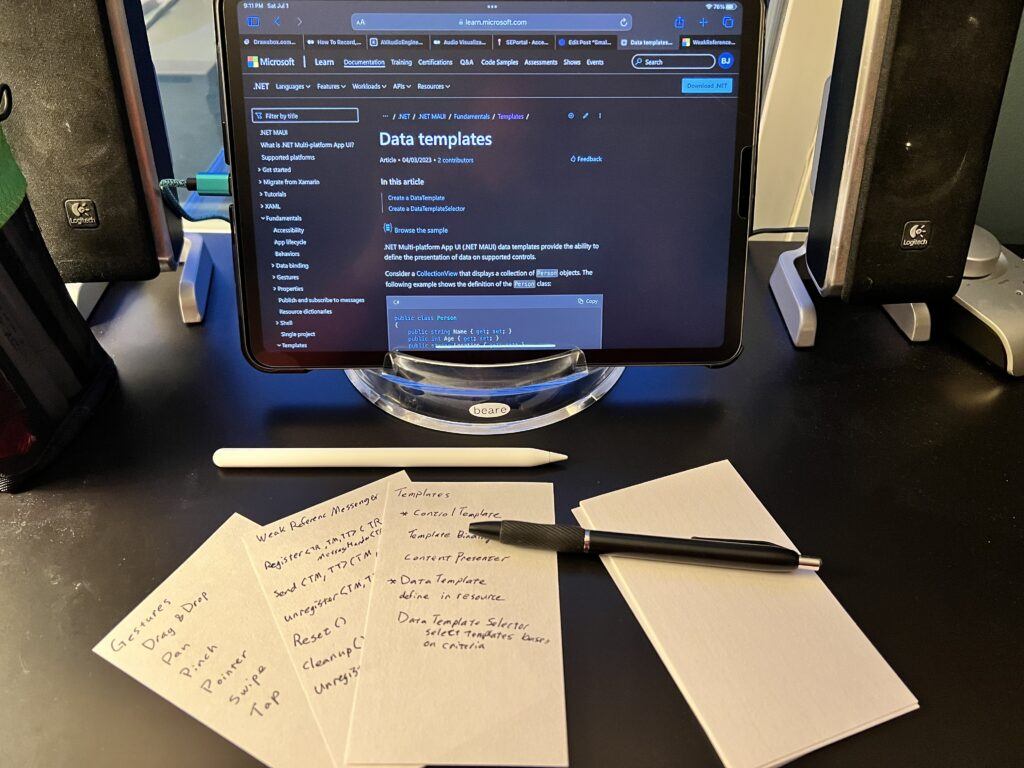Invest in Your Career Growth with Small Habits for Professional Development

Some Professional Development activities are time-consuming. Gaining a certification for a cloud platform, for example, requires hours of learning and study before the hours of testing. This may feel like an intimidating amount of work. However, even a busy schedule can include a few small habits for professional development that, over time, will add up to a lot of learning.
Tip of the Day
Let’s start with a technique I learned from former SEPeer, Giuliana. Learn one thing a day. Start by expanding your knowledge of your project. Focus on the technologies, techniques, or domains you’re using.
Know where the documentation can be found. Several projects, like Angular or Xamarin, have extensive documentation both APIs and guides for how they should be used. Bookmark or add them to you home page. Each day look up and read one new API.
Most projects, especially container or JavaScript projects, have a number of configuration files. Learn the implications of just 1 setting. Once you understand how the project is configured, take a look at the settings you aren’t using. Understand them and maybe you can find better ways to meet your project’s needs.
PD Journal
One of the things that ups the effectiveness of the daily tips is to record what you have learned. This can be as simple as pen and paper. There is always pen and paper around the office.
Of course, there are some drawbacks to analog tools for this job. They lack search capability and you can’t click a hyperlink to information you’ve found. Digital note-taking is a large and varied topic, but it can be as simple as a text file named PD.txt where you record your notes. Another low-friction recording method is to slack yourself in your personal channel. No one else has to see it for it to be useful to you. And slack has search built in.
Every now and again, on a monthly or weekly basis for instance, you should review and summarize what you’ve been learning as one of your habits for professional development. This will help you contextualize what you’ve been learning. These summaries are also useful when talking to others about your PD activities.
Curate your news feed
Another source of information is knowing what is possible and current. This is not so much an active act of learning, but an ambient listening to community and news.
Does a project you use have a blog like the Phoenix Framework? You could bookmark it or subscribe with RSS and check for release notes. Does the language have a ‘Planet’ blog like Planet Clojure or a news letter like Elm Weekly? You could subscribe to that and see what the community is doing. Are you following community leaders on LinkedIn, Twitter, or Mastodon? Have you joined a Discord? Do you follow the YouTube channel for a conference like Ember Conf or project such as Babylon JS? Just skimming titles or news articles can give you insight in to what is new or important to the community. I’ve often found it useful to just know there is a thing shaped like the problem I’m currently facing.
Share
As part of a community, be it at work or the broader profession, it is important to share. We learn because of the efforts others put in to sharing their knowledge and we can pay it forward.
There are slack channels ready to hear a new command line or a configuration “gotcha.” A blog post can help to not only clarify your thoughts, but spread understanding. Stand-ups can be a place to mention a change or new approach in the project.
Mapping
It is useful to map out the topics surrounding your study field: both the things you know and the things you don’t know. A simple outline will help categorize topics and show relationships between them. Try a mind map to go even farther to clarify the relationships between topics that don’t fit hierarchically.
Small Professional Development Habits Compound
Finding a small way to broaden your technique or understanding will continue to make each day’s work better. If you start a project in an unfamiliar technology, you will have a way to slowly broaden your understanding and constructively grow. Most importantly, tracking it will allow you to look behind and see your path and to know how far you’ve come.
Work with awesome people.
Check out our current openings for your chance to build things that matter with creative, curious people.
You Might Also Like